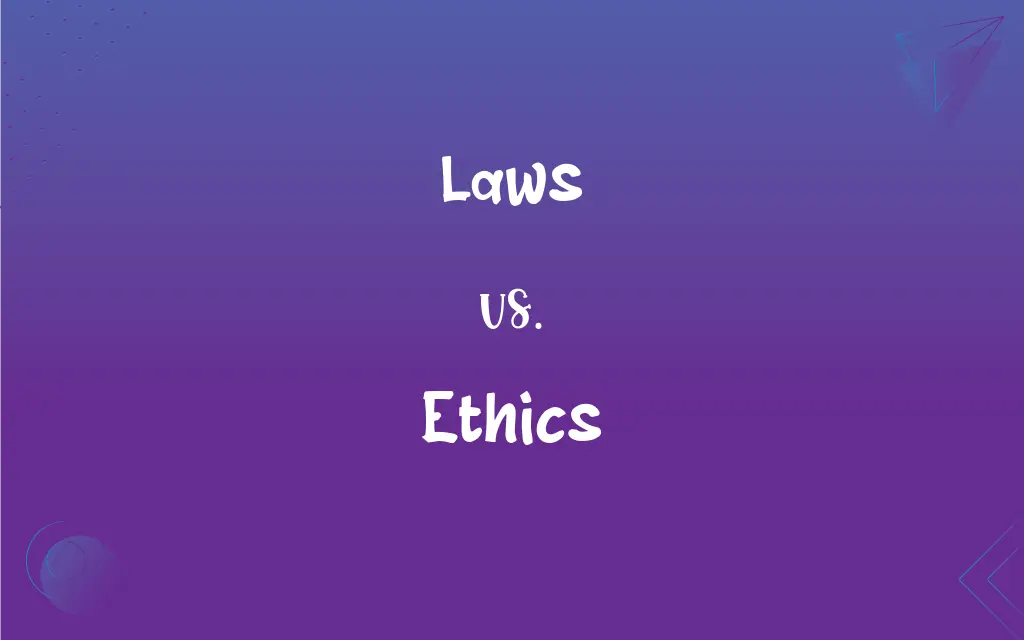Laws vs. Ethics: What's the Difference?
Edited by Janet White || By Aimie Carlson || Updated on October 14, 2023
Laws are formal rules enforced by authority, while ethics refer to moral principles guiding behavior. Laws mandate compliance; ethics inspire conscious conduct.

Key Differences
Laws provide a structured framework to govern behaviors within a society, ensuring order and justice. It's essential to recognize that laws are institutionally approved standards that dictate what is permissible and impermissible in a societal context. On the other hand, ethics dwell in the realm of morality, directing what one ought to do, providing a moral compass that navigates through moral dilemmas and ethical scenarios. Laws provide tangible and enforced boundaries for behavior, while ethics supplies a moral framework that might differ from individual to individual.
Ethics refers to moral principles that guide decision-making and behavior, often informed by cultural, philosophical, or social beliefs. Unlike laws, ethics are not formally enforced by legal authorities but are regarded as fundamental to maintaining integrity and decency in societal and professional contexts. The difference between laws and ethics often lies in enforcement and formulation: laws are officially sanctioned and impose penalties for violations, while ethics serves more as an internal guide based on virtue and morality.
The application and scope of laws and ethics often intertwine, yet retain distinct characteristics. Laws create a minimum standard of behavior that’s expected of all members of society and is enforced by governmental entities through various punitive measures. Ethics, while deeply embedded in considerations of right and wrong, might not always be encapsulated within the legal frameworks and often govern areas where laws might be non-existent or insufficient. Therefore, while laws dictate a standard accessible and applicable to all, ethics might bring about personal and situational variations in application and perception.
In some instances, what is legal is not always ethical and vice versa, underscoring the divergence between laws and ethics. For instance, certain business practices may be legally permissible but regarded as ethically dubious due to unfair impacts on certain stakeholders or communities. Similarly, certain ethical imperatives, such as telling the truth, might not always be enshrined in legal structures. Thus, while laws and ethics both navigate the terrains of right and wrong, they differ fundamentally in origin, application, and enforcement, weaving a complex tapestry of societal conduct and morality.
Comparison Chart
Definition
Formal rules enforced by authority
Moral principles guiding behavior
ADVERTISEMENT
Enforcement
Legal authorities
Personal or societal norms
Scope
Applies to all citizens
May vary individually
Penalties
Legal penalties (fines, imprisonment)
Social disapproval, loss of reputation
Flexibility
Generally rigid and well-defined
Can be subjective and situational
Laws and Ethics Definitions
Laws
Codified norms imposing obligations and prohibitions.
Environmental laws mandate companies to adhere to pollution norms.
ADVERTISEMENT
Ethics
Values shaping personal and professional behavior.
Medical ethics compel doctors to prioritize patients' well-being.
Laws
Legislated rules guiding societal conduct.
Traffic laws regulate vehicle movement to ensure road safety.
Ethics
Philosophical concepts of right and wrong.
Ethics often assess the morality of actions and their impacts.
Laws
Formal regulations imposed by a governing authority.
Laws against theft prevent unlawful possession of others' properties.
Ethics
Moral principles influencing conduct.
Ethics guide individuals to make morally upright decisions.
Laws
Statutory principles established to maintain order.
Laws safeguard societal order by prescribing acceptable behavior.
Ethics
A system validating moral choices and actions.
Environmental ethics might inspire sustainable living practices.
Laws
Enforceable standards to secure justice and fairness.
Laws protect citizens’ rights and provide mechanisms for redress.
Ethics
Norms fostering honesty and integrity.
Business ethics encourage fair practices in organizational conduct.
Laws
Plural of law
Ethics
A set of principles of right conduct.
Laws
The police.
Ethics
A theory or a system of moral values
"An ethic of service is at war with a craving for gain" (Gregg Easterbrook).
Laws
The first five books of the Old Testament, also called The Law and Torah.
Laws
The first of three divisions of the Hebrew Scriptures comprising the first five books of the Hebrew Bible considered as a unit
FAQs
What is criminal law?
Criminal law pertains to actions that violate established statutes and are offenses against the state or public.
Why are laws created?
Laws are established to maintain order, protect citizens, resolve disputes, and uphold justice and liberties in a society.
What are civil laws?
Civil laws concern disputes between individuals, organizations, or both, and usually involve private rights and liabilities.
What is bioethics?
Bioethics is a field of study concerned with the ethical and philosophical implications of certain biological and medical procedures, technologies, and treatments.
Can ethics be taught?
Yes, ethics can be taught and learned through education, dialogue, and reflection on moral issues and dilemmas.
What is a constitution?
A constitution is a foundational legal document that outlines the fundamental principles and laws governing a nation.
Why is ethics important?
Ethics is crucial to navigate moral dilemmas, establish societal norms, and ensure harmonious interpersonal interactions.
What is a legal system?
A legal system is an overarching framework that establishes, enforces, and interprets laws within a jurisdiction.
How are laws enforced?
Laws are typically enforced by designated governmental institutions, such as police departments and judicial systems.
What is the difference between ethics and morals?
Ethics often refers to common standards or a framework for conduct, while morals typically refer to an individual's beliefs about right and wrong.
What is business ethics?
Business ethics involves applying ethical principles and moral or ethical problems that might arise in a business environment.
What is ethical dilemma?
An ethical dilemma involves a situation in which an individual faces conflicting moral principles, making it difficult to choose a clear ethical course of action.
What is applied ethics?
Applied ethics involves examining specific controversial issues through a framework of ethical principles.
Can laws change?
Yes, laws can be amended, added, or repealed based on societal needs, changes, and demands.
What are statutory laws?
Statutory laws are laws enacted by a legislative body and written into formal legislation.
What is ethics?
Ethics involves systematizing, defending, and recommending concepts of right and wrong behavior, often pertaining to moral values.
What is normative ethics?
Normative ethics involves identifying and advocating for the right moral course of action in various situations.
What are laws?
Laws are established and enforceable rules or guidelines created by an authority, like a government, to regulate conduct.
What is common law?
Common law is a system where law is developed by judges through decisions of courts and is based on precedent.
Are ethics universal?
While some ethical principles might be widely accepted, ethical beliefs can vary significantly among different cultures, individuals, and contexts.
About Author
Written by
Aimie CarlsonAimie Carlson, holding a master's degree in English literature, is a fervent English language enthusiast. She lends her writing talents to Difference Wiki, a prominent website that specializes in comparisons, offering readers insightful analyses that both captivate and inform.
Edited by
Janet WhiteJanet White has been an esteemed writer and blogger for Difference Wiki. Holding a Master's degree in Science and Medical Journalism from the prestigious Boston University, she has consistently demonstrated her expertise and passion for her field. When she's not immersed in her work, Janet relishes her time exercising, delving into a good book, and cherishing moments with friends and family.































































